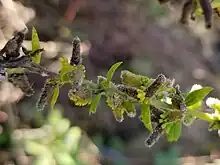Rhopalomyia anthophila
Rhopalomyia anthophila the Downy Flower Gall Midgeis a species of gall midges, insects in the family Cecidomyiidae. It induces galls on the host Solidago altissima across much of North America.
| Rhopalomyia anthophila | |
|---|---|
 | |
| R. anthophila gall | |
| Scientific classification | |
| Domain: | Eukaryota |
| Kingdom: | Animalia |
| Phylum: | Arthropoda |
| Class: | Insecta |
| Order: | Diptera |
| Family: | Cecidomyiidae |
| Supertribe: | Lasiopteridi |
| Tribe: | Oligotrophini |
| Genus: | Rhopalomyia |
| Species: | R. anthophila |
| Binomial name | |
| Rhopalomyia anthophila (Osten Sacken, 1869) | |
| Synonyms | |
| |
Galls and Biology
The gall that is a modified capitulum, which is cylindrical and measures 5–10 mm (0.20–0.39 in) in length and 2–3.5 mm (0.08–0.14 in) in width. It is usually slightly wider bassaly than at its tip and is covered by short, white hairs that give it a fuzzy appearance. The gall is green, situated among normal capitula, accompanied by tiny leaves and/or ray florets at its base. The gall contains a single chamber with an inner, conical chamber that contains a single larva facing downwards. Larvae turn to face upwards before pupation. Galls become apparent in mid-August, and pupation takes place in late August to mid-September. [1] [2]
References
- Dorchin, Netta; McEvoy, Miles V.; Dowling, Todd A.; Abrahamson, Warren G.; Moore, Joseph G. (July 2009). "Revision of the goldenrod-galling Rhopalomyia species (Diptera: Cecidomyiidae) in North America" (PDF). Zootaxa. 2152 (2152): 1–35.
- Felt, Ephraim Porter (1917). "Key to American Insect Galls". New York State Museum Bulletin. 200: 95-97.
External Links
Gall-Inducing Insects: From Anatomy to Biodiversity [1]
A Catalog of the Cecidomyiidae (Diptera) of the World [2]
- Fernandes, G. W.; Carneiro, M. A. A.; Isaias, R. M. S. (March 2012). Gall-Inducing Insects: From Anatomy to Biodiversity (PDF). pp. 369–395. Retrieved March 28, 2023.
- Gagné, Raymond J.; Jaschhof, Mathias (2017). "A Catalog of the Cecidomyiidae (Diptera) of the World, Fourth Edition" (PDF). Agricultural Research Service, US Department of Agriculture. Retrieved 2018-03-27.